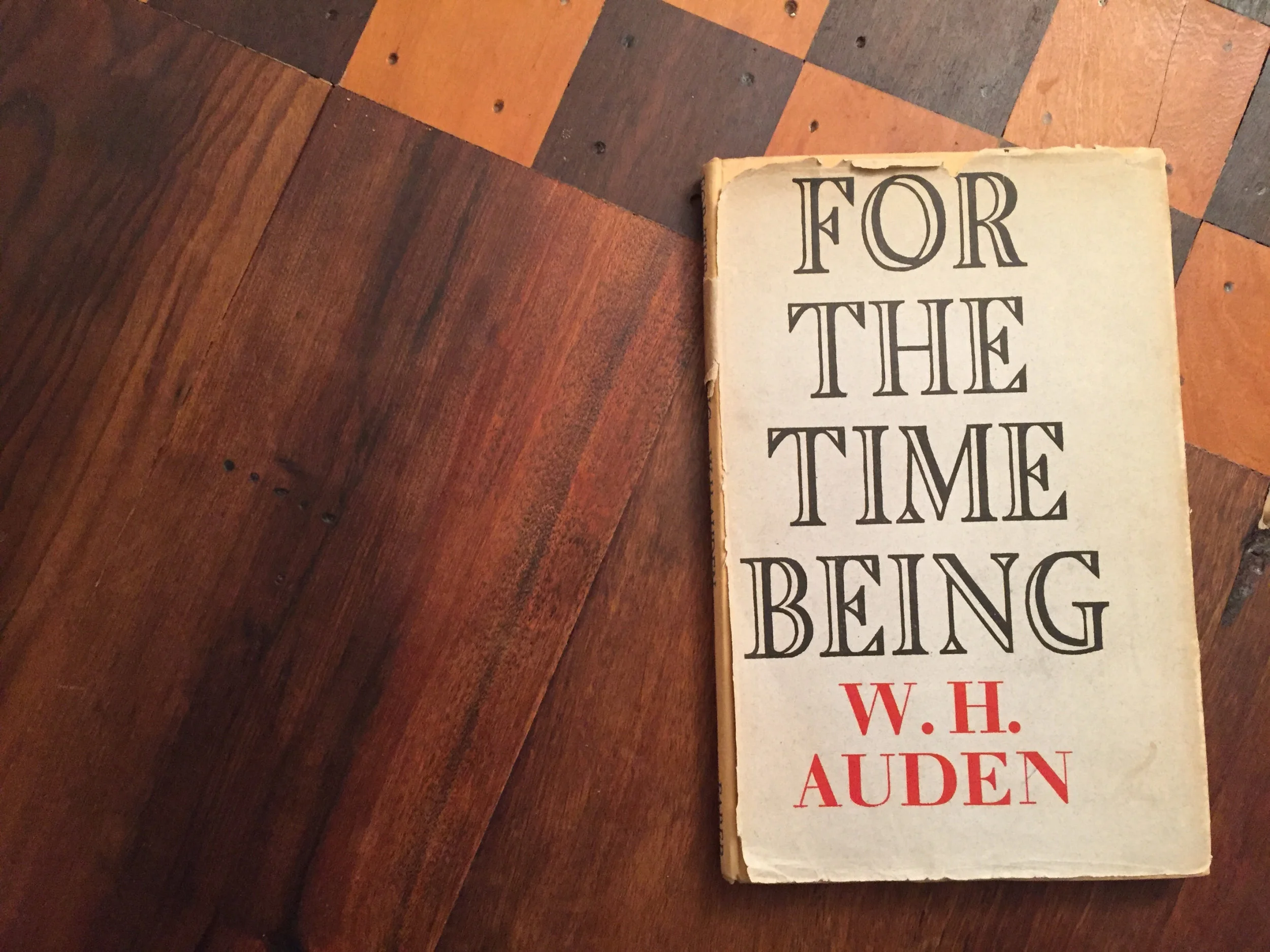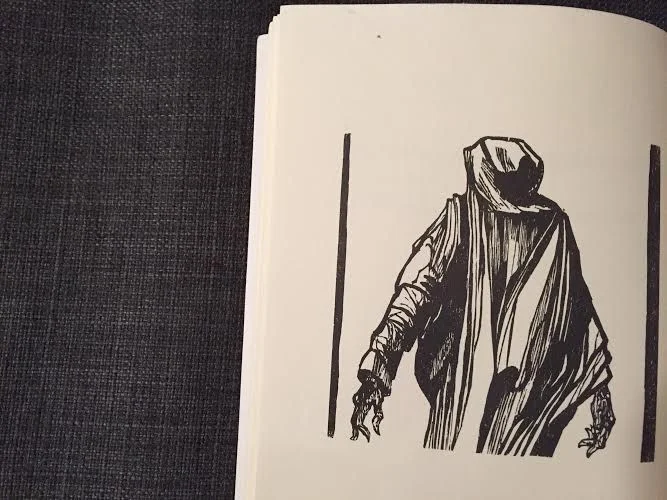Some thoughts about WH Auden's poem, For the Time Being
When it comes to faith, I have a much easier time brushing myself under my own rug than actually beefing up to talk about it. My own journey with faith, meaning to be certain about what is totally absurd and without apology for the irrational belief, is wracked with uncertainties, inconsistencies and discomforts. It is an intellectual and spiritual battle that is more satisfying to poke at privately than in a discussion with others. Although I value my solitude, I would at times wish to ask someone for clarity. I'd like the input but cannot stand the intrusion on my privacy.
In For the Time Being: A Christmas Oratorio, the poet W.H. Auden poses the question,
How can he hope and not dream that his solitude
Shall disclose a vibrating flame at last and entrust him forever
With its magic secret of how to extemporise life?
When I get caught up in narrating my own faith—done with good intentions, to relieve—I hiccup with doubts. Extemporizing life is every good-intentioned person’s pipe dream.
Auden scrutinizes himself as he struggles with the mythos of religion, his own eloquent interiority, as well his own ambivalence for what to believe about his religion. For the Time Being retells the Christmas story, the nativity, in a mid-20th century England. When he wrote his book of monologues from Biblical characters’ perspectives, it was 1944 and the world was at war. Auden, who had already established himself at a young age as a literary giant of the twentieth century, found cohesion in the translations of the philosopher Søren Kierkegaard, reading and reviewing him voraciously. At a time of war, evil was conspicuous, and good was overwhelmingly opaque.
The book is an interrogation of good and evil. It’s a complicated book, wrought with an eclectic gathering of other philosophers. There is, however, a consistency in the book with Auden’s other poetry. No word is more his than any other living person’s.
On the surface, Auden is a public poet and not overly difficult to enjoy. That said, knowing a little about Kierkegaard’s existentialist philosophy will help one swim somewhat better. Kierkegaard argued for the suprarationality of faith—or, faith not explained through reason. His book Fear and Trembling drew out nuances from the Binding of Isaac, the Biblical story of Abraham going out into the mountains one morning to sacrifice his son, Isaac. Abraham is the grandfather of faith in our major world religions — Judaism, Islam, Christianity. Kierkegaard pursues Abraham in his text, for how can he make sense of faith if he can hardly understand Abraham?
Auden, following the trajectory of inexpressible faith in Fear and Trembling, tries to understand the moment where the incarnation took place during the nativity. He borrows the stories from the Gospels of Matthew and Luke, and modernizes each character to ventriloquize numerous philosophers, theologians, and public figures of the 1930s and 40s. Mary speaks, and Joseph, and the wise men. King Herod appears, almost in the voice of a war-time Franklin Roosevelt. You find thinkers like Kierkegaard and Reinhold Niebuhr—almost verbatim—dictating the language of the poems. You find Carl Jung’s four faculties, personified, reciting verse in a surreal dance of pastoral poetry. Characters are pushed to a crisis of faith, to believe that an infinite being, a God, could become flesh like them, like someone who suffered. They survive on faith—on love—until death.
Auden begins the poem, as the nativity began, with national unrest. More modernly, it also begins with an English winter scene:
Darkness and snow descend;
The clock on the mantelpiece
Has nothing to recommend.
and,
The evil and armed draw near;
The weather smells of their hate
And the houses smell of our fear.
Despair isn’t necessarily set during any historical period. The clock represents a person’s battle against a history that lends nobody an entry point. These characters aren’t historical studies nor are they notably sacred. A reader starts to feel she could get to know Saint Joseph. Auden explained to his father in a letter that a sacred event like the nativity “recurs every time it is accepted.” Accepting the event requires a person to feel close to that sacred character. Auden’s case appears to be that this battle against history and ambivalence to that which is sacred weakens a person -- a nation -- a culture -- more than political or national distress. Perhaps it is even the cause.
To help the reader keep up with his epistemological goliath, Auden also wrote a cordial Narrator into the poem who provides some context and commentary.
During the book’s first section, Advent, the Narrator speaks of an abrupt existential crisis happening across a nation. As you read the following section, notice how the Narrator uses the pronoun we to extract this instance of supreme loneliness and isolation.
Just how, just when It succeeded we shall never know:
We can only say that now It is there and that nothing
We learnt before It was there is now of the slightest use,
For nothing like It has happened before. It’s as if
We had left our house for five minutes to mail a letter,
And during that time the living room had changed places
With the room behind the mirror over the fireplace;
It’s as if, waking up with a start, we discovered
Ourselves stretched out flat on the floor, watching our shadow
Sleepily stretching itself at the window. I mean
That the world of space where events re-occur is still there,
Only now it’s no longer real; the real one is nowhere
Where time never moves and nothing can ever happen:
I mean that although there’s a person we know all about
Still bearing our name and loving himself as before,
That person has become a fiction; our true existence
Is decided by no one and has no importance to love.
Pour a glass of wine sometime and read these lines to yourself at full volume. Going into that world where faith and language are connected by a pole, where one moves and the other moves farther away—that is Auden’s extraordinary accomplishment.
The poem is a curiosity for Auden scholars as it is his only attempt to take on a sacred subject in such a direct way, even though he remained a Christian all his life. Auden believed that all poetry deals with pagan subjects. Even Paradise Lost discusses the fall from grace in the language of epic poetry from Homer, Virgil and Dante. The impressions we glean from artwork then should come with a sense of uneasiness. Some of the poetic modernisms of the poem are the delightful ironies. In a poem that strives for an apologia of faith, Auden will undermine himself hysterically. Auden’s game again is to show how each person grappling after faith sees the whole thing from a different psychological perspective.
Before the angel Gabriel appears to Mary at the annunciation, Auden writes a glorious passage of pastoral imagery where the speakers are none other than personified versions of Carl Jung's Four Faculties—Thought, Feeling, Intuition, and Sensation.
As though the book’s situation wasn’t weird already, the Four Faculties chant their woes outside the Garden of Eden and convey to the reader what lies within the walls. Each of them has a separate interpretation of Eden.
The verse is vexing. Intuition looks into Eden and reports an industrial wasteland. What does Feeling see? A fairyland of mathematics, where existence is “an archaic nuisance.” While these scenes at times feel like digressions, Auden is building out the dramatic milieu of the absurd and the real. Per Jung’s theories, each of these Biblical characters have competing faculties. Their problems are everyone’s problems. We’re reminded that even the sacred family had a sensibility about time, place, and anxiety.
As we know, Mary and Joseph can’t get a hotel room. And something rather unusual, amazing, happened at the manger. We know this much. The most difficult part to understand is that each character at the manger on that starry night necessarily had to -- was required to -- renounce their faculties one by one. That is, they needed to renounce their despairs and what made them rational humans. That night they made a leap of faith to believe in the Incarnation.
In the section, “At the Manger,” Mary speaks to the Child:
O shut your bright eyes that mine must endanger
With their watchfulness; protected by its shade
Escape from my care: what can you discover
From my tender look but how to be afraid?
Love can but confirm the more it would deny.
Close your bright eye.
Sleep. What have you learned from the womb that bore you
But an anxiety your Father cannot feel?
Sleep. What will the flesh that I gave do for you,
Or my mother love, but tempt you from His will?
Why was I chosen to teach His Son to weep?
Little One, sleep.
Dream. In human dreams earth ascends to Heaven
Where no one need pray nor ever feel alone.
In your first few hours of life here, O have you
Chosen already what death must be your own?
How soon will you start on the Sorrowful Way?
Dream while you may.
The best poetry changes and grows as you sit with it over time. For the Time Being is a challenging read. The poem's modernity is to dispel one’s impulses towards intellectualizing religion even as it employs varied registers and tones and academic rigor. It is existential. To engage with it means refusing to look on our neighbors on the matter of faith. With faith, there are no neighbors. A person accepts the sacred event in solitude.
There lies the rub. There is the intellectual challenge. Even if one accepts the absurdity of the Incarnation, how do you express such a thing? Late in the poem, a choral group sings, “We are bold to say we have seen our salvation.”
Reading For the Time Being will surface a discourse of timelessness and sympathy, and no doubt give psychedelic colors to your normal Christmas church service. No less, it will reveal the person most outspoken about his faith as an idiot.





